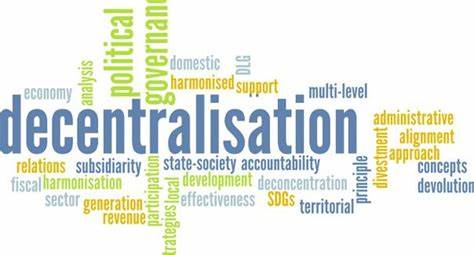Advantages and Disadvantages of DecentralizationDefinition of DecentralizationDecentralization is the process through which an organization's operations are disseminated or delegated away from a central, authoritative location or group, particularly those relating to planning and decision-making. Political science, law, public administration, economics, money, and technology, as well as group dynamics and management science in private firms and organizations, have all benefited from the application of decentralization concepts. 
Decentralization is the process through which some powers, tasks, and responsibilities are transferred and delegated from higher-level, central, or top-tier government to lower-level management or subordinates. This is because delegation would increase the number of hands on deck, which would speed up task completion. It would also encourage organizational effectiveness and speed by allowing higher authorities to concentrate on important decisions and duties. Additionally, with more minds engaged in the work, increased productivity is a possibility. As the post-Revolution French Directory leadership established a new governmental framework, the term "centralization" first appeared in French in 1794. In the 1820s, the term "decentralization" first appeared. In the first part of the 1800s, "centralization" and "decentralization" were first used in written English. Tocqueville stated that the French Revolution started as "a push towards decentralization...[, but] became, in the end, an extension of centralization" in the mid-1800s. Maurice Block, a retired French official, examined the mechanics of bureaucratic and governmental centralization and more recent French attempts at decentralizing government services in an article titled "Decentralization" for a French publication in 1863. Anti-state political activists identifying as "anarchists," "libertarians," and even "decentralists" carried the concepts of liberty and Decentralization to their logical conclusion during the 19th and 20th centuries. Tocqueville, a supporter, wrote: "Decentralization has not only an administrative value but also a civic component since it provides the opportunity for citizens to take involvement in public affairs; it makes them grow used to exercising freedom. 
The most effective defense against the claims of the central authority is created from the accumulation of these local, active, and demanding liberties, even if an impersonal, collective desire backs them. All of Pierre-Joseph Proudhon's economic theories, which he developed over 25 years, may be encapsulated in the phrase "agricultural-industrial federation," according to the prominent anarchist theorist (1809-1865). Political federalism or Decentralization is the foundation that underpins all of my political beliefs. Advantages of Decentralization:Moving tasks from an organization's central level to its local or district levels is a technique known as Decentralization. Decision-making, authority, and planning are decentralized through this procedure. Organizations and businesses can profit greatly from it. Costs can be decreased, and process effectiveness can be increased with the help of Decentralization. It is only suitable for some organizations, though.
As is the intention of the division of labor and general Decentralization, higher authorities and top executives are relieved of all these responsibilities currently carried out by their subordinates. As a result, their area is decluttered, and they have more time and resources to concentrate on the most significant, intricate, and crucial tasks.
Diversification always happens when the senior executives are relieved of their burdens. The same government or organization creates branches and subbranches to handle different jobs and obligations. As specialized responsibilities or the welfare of a certain population are delegated to multiple departments and organizations, expansion becomes more fluid. Additionally, more jobs are created as a result of this diversity. As more tasks are assigned, more people are needed to fill in for them.
Decentralization can be a potent instrument for those who desire to regain their independence and sovereignty. Additionally, it bestows prestige in the form of status, which people may desire even more than other goods like money or fame because of its relative exclusivity within society.
Decentralized networks encourage open development through how they function. The networks can expand upon the network itself by adding services, tools, and even products by fostering an environment of open development. For instance, Linux is open-source and includes an ecosystem that enables anyone to modify it. Centralized networks, however, are closed sources, which restricts advancement. Decentralized models are here to stay and can displace centralized models as the standard operating procedure. Not only have bitcoin, and other cryptocurrencies increased in popularity, but some countries are now debating whether a decentralized voting system is practical and the future of the energy industry, environmental protection, social responsibility, and government. Decentralization and blockchain, the technology that enables it all, are experiencing a thrilling period right now.
The core of Decentralization is the ability to divide jobs into smaller pieces that can be completed in a shorter amount of time than if they were handled in their original entirety. Because separate employees individually manage each sector, this delegation makes it simpler to make judgments swiftly in any of these assigned areas. Decentralization also encourages flexibility because it makes each sector competitive and allows for quick decision-making with less time wasted.
Management and oversight are improved through Decentralization. It is simpler to administer each department because divisions and sub-divisions regulate how everything is organized. These departments typically have appointed heads, relieving the higher authorities of managing each department personally. These managers direct and oversee the staffers who report to them, and they inform the senior managers of the situation. These leaders also exert some degree of influence over their staff members by assigning tasks, enforcing discipline, and making changes as they see fit, provided that doing so serves the interests of the group as a whole.
When a level of government, organization, or corporation is given tasks that allow them to operate freely and manage their affairs, they may be able to generate income internally. For example, when a grass-roots level government is given autonomy to manage its affairs through devolution, they are essentially in command of its markets and market pricing value, taxes, industries, etc. As a result, they are also responsible for managing the allocation and revenue they create through their governance activities.
Decentralization raises job satisfaction and morale among employees, especially among lower-level supervisors. Additionally, it tries to meet the various standards for involvement, independence, and prestige. Decentralization also fosters a sense of group spirit and cohesion.
About the previous point, decentralized networks are extraordinarily safe due to the way they manage data and transactions. These networks employ encryption and hashing not only to produce blocks but also to guarantee the safety of the data ledgers. Since each block in the chain needs information from the blocks before and after it to use cryptography to validate the data, the more transactions that take place on the network, the more blocks that are created, and the more secure the data become-there is truly no weak link in the chain-the more blocks that are created. While it is untrue that a blockchain ledger could never be hacked, doing so would indeed be impractical given that it would entail changing data in thousands, if not millions, of blocks without being noticed.
Every product division achieves sufficient autonomy to use its creative flair under Decentralization. The top-level management can foster healthy rivalry among the various divisions. Decentralization supports subordinates in using their judgment, which must be kept in mind when weighing the benefits and drawbacks of the system. They even help to solve the succession issue and build managerial abilities, which in turn ensures the survival and expansion of a firm.
Lower-level supervisors have the authority to change job assignments and production schedules. They may even recommend that their peers be promoted and take disciplinary action. Greater supervisory efficiency follows from this. Each dispersed unit's performance review aids in ensuring effective control. Disadvantages of Decentralization:Delegation can be seen as a continuation of Decentralization. It is the methodical transfer of managerial authority to middle and lower-level management by their level of responsibility. Absolute authority cannot, in practice, be given to lower-level managers.
At the medium and lower levels, Decentralization requires managers who are qualified, competent, and skilled. According to their expertise and qualifications, they will receive compensation.
The top-level management places increased pressure on departmental managers during Decentralization to boost output and income. In such a scenario, each department prioritizes its departmental aims over corporate ones. Inter-departmental conflict could result from this, and coordination and control issues can arise from too much fragmentation.
Decentralization entails a greater financial burden, the need for skilled staff who can accept leadership, and the inability of small businesses to hire specialists in a variety of sectors.
Lower and intermediate-level managers only receive authority for routine choices in a decentralized system. Due to their lack of authority, they are unable to make decisions whenever they encounter difficult and non-programmed problems.
As a result of authority being broadly distributed throughout the company, the Decentralization of power makes coordination issues more difficult.
Decision-making power is delegated to the lower level in Decentralization. If lower-level managers lack the necessary skills and abilities, they may make poor decisions that increase risks and cause losses.
Some service types may not lend themselves to the decentralization paradigm. It is not appropriate for services of a specialist nature, such as accounting, human resources, engineering, medicine, etc. The Conclusion:Businesses can increase their efficiency and agility by utilizing the potent instrument of Decentralization. It can assist companies in overcoming obstacles and seizing new chances when applied effectively. Although there is no one-size-fits-all method for Decentralization, organizations should carefully weigh its advantages and disadvantages before going through with it. |
 For Videos Join Our Youtube Channel: Join Now
For Videos Join Our Youtube Channel: Join Now
Feedback
- Send your Feedback to [email protected]
Help Others, Please Share









